 |
|
|
|
|
|
|
|
 |
 |
 |
 |
|
|
 |
 |
 |
|
|
 |
The first computer I ever laid hands on was in high school: a DecWriter terminal with an acoustic coupler ("cradle modem") that hooked us up to the actual computer, which was located in another school. It wasn't too impressive, even at the time (1978). I wanted to see the actual computer.
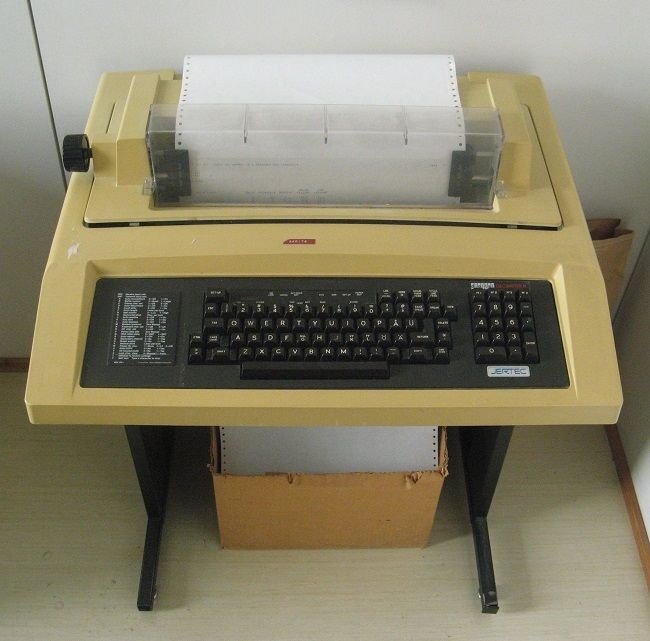
Then my school got a (yes, one) TRS-80 for student use:
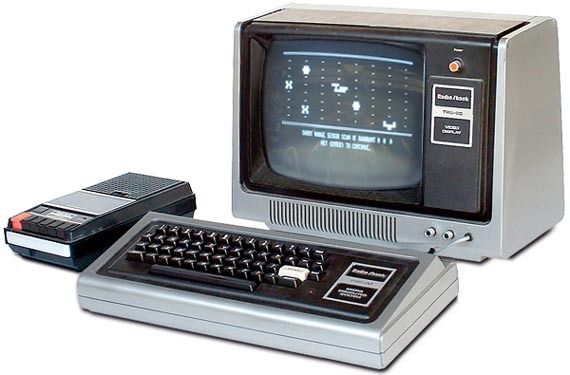
There were 500 kids in my graduating class, but only about 20 of us were taking Computer Science, so I did get some time on the machine. It was a big deal, very cool. And this was a monochrome screen that couldn't show photos. I think it had 4 Kb of internal memory, which meant you could type in a huge BASIC program if you had the time. What more did you want?
It was still a big deal in those days to own your own computer. You were somebody.

This beauty, the Apple II, came out in 1977, and I couldn't dream of affording one:
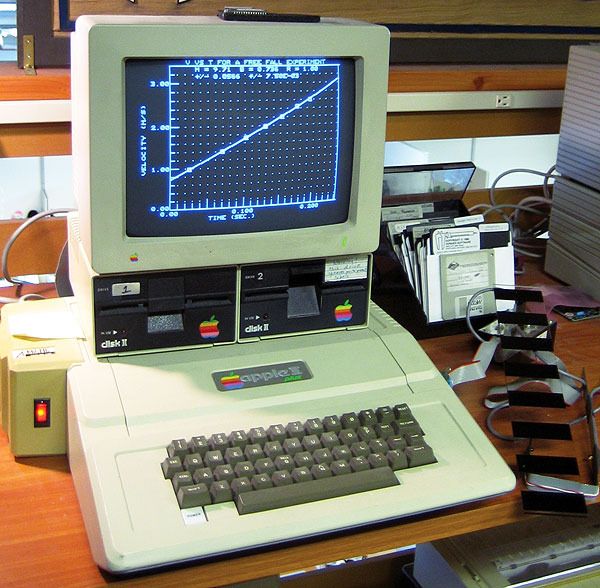
The magazines I was reading, like OMNI and FUTURE (the STARLOG spinoff), started hyping home computers as the Coming Revolution. The claim was that PCs would soon be almost as commonplace as TV sets, and you'd use yours to control the thermostat and start the coffee maker. And don't forget "balance your checkbook." That was a big one they always mentioned.
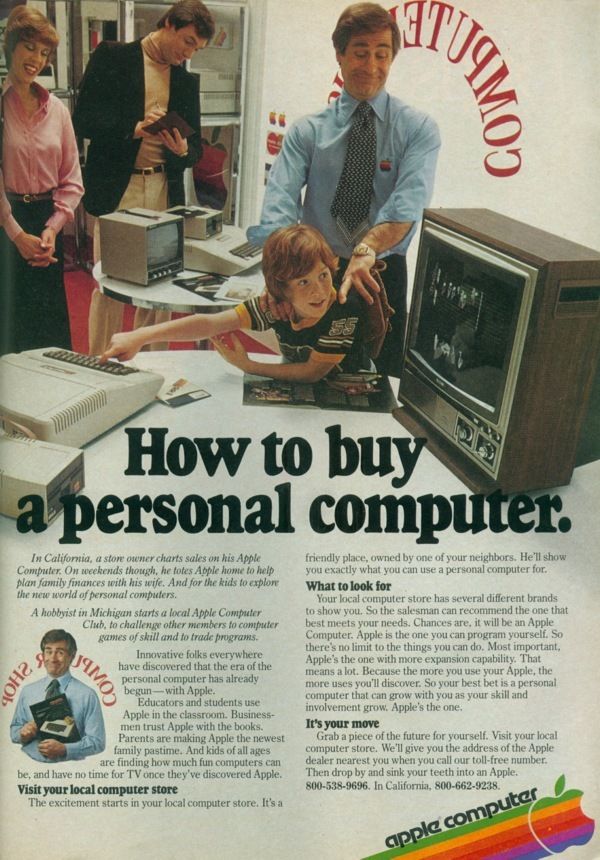
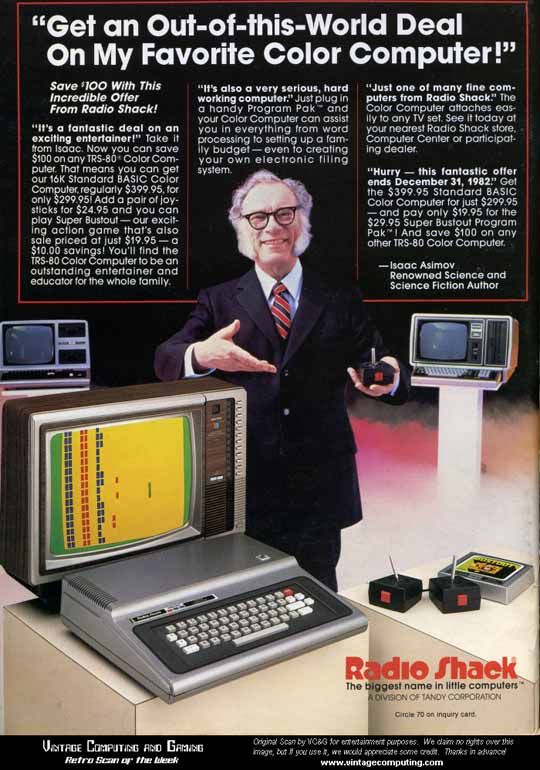
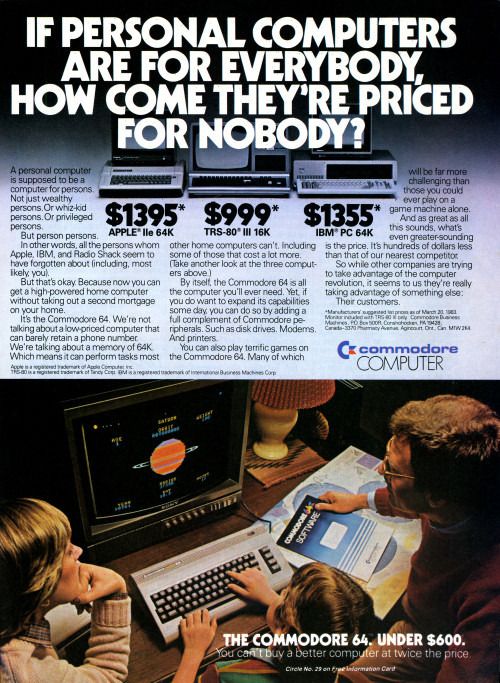
$1395 in 1982 would be almost $3400 in today's dollars. You had to shell out for a machine back then.
Around 1981 I bought my first home computer, a TI-99/4A for $300. I mostly played chess on it:
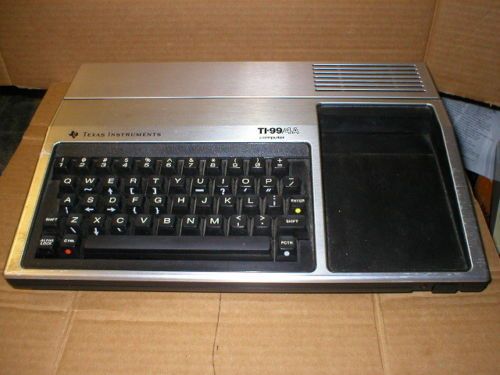
The 1970s and '80s were a time of great computer lust for me, and great hopes, but it would be "modern" PCs in the '90s that were really useful, and real Revolution would be the Internet.
 |
|
|
|
|
|
|
|
|
|
 |
While it might not have been on U.S. radar, the BBC microcomputer (specifically the 'B') here in the U.K. was a milestone in home computing.
Never heard of it. Love it. Filed it in my scrapbook. 
I never saw the BBC Micro or re-branded twin model offered in the U.S., but I'm sure many countries did see it.
|
|
|
|
|
 |
I still have a Commodore 64 that I switch on from time to time to play a game. It needs half an hour or so before it works properly though...
|
|
|
|
|
 |
 |
 |
Posted: |
Apr 20, 2015 - 7:09 AM
|
|
|
|
By: |
Grecchus
(Member)
|
My first brush with a home computer was the ZX Spectrum, made by Sinclair Research LTD.
It was a nasty surprise to discover the high resolution graphics touted to be one of the machine's capabilities, did not come anywhere near to the resolution of the scientific/cinematic standard of the early 1980s. The images we saw on TV at that time were typified by Dr James Blinn's digital portrayals of the Voyager spacecraft in their flybys of the outer gas giants. In plain ignorance I assumed I'd be able to see the same standard of imagery via the Speccy! These professional images were probably generated on PDP-11 or Vax mini-computers, by direct comparison with the somewhat more modest ZX Spectrum. 
I came up to speed fairly quickly, given the initial unrealistic expectancy I'd had of what was then considered state of the art in home computers. The microprocessor Sir Clive chose to power his machine was the Zilog, 8-bit Z80, which up to that time, had become a very respected piece of hardware indeed. After some general reading it became apparent the book you needed to obtain in order to learn to program the Z80 was Rodnay Zaks' fabled text, "Programming The Z80." This book, more than any other, clarified how the CPU was self-contained with it's instruction set and the registers necessary to perform operations on data that could be fetched to and from an attached memory. The actual concept of a Turing Machine was something that would become familiar only much later, as it turned out. Very much a chicken and egg situation, in terms of what you should learn about first. That book, originally published by Sybex, is one of my treasured pieces of historical literature on the subject. In fact, the Z80 was pertinent not only to the Spectrum, but also to whatever hardware platform embedded it. The next phase of the revolution saw Intel's 16-bit processors rise to fame inside the IBM PC clone, and made all the more tangible via Microsoft's ms-dos operating system.
http://www.amazon.co.uk/s/ref=nb_sb_noss?url=search-alias%3Dstripbooks&field-keywords=programming%20teh%20z80%2C%20zaks
The subject of machine code/assembly language abstraction is one that has to be approached very carefully. The few enlightening books that showed how to get the most from the machine took so long to arrive on the shelves that it became obsolete before I, at least, could put any of the ideas from them into any sort of practical use. The going was typically, very slow. The general public is still largely unaware that any computer's microprocessor architecture has the capability to perform any conceivable data processing operation required to generate meaningful information. At the very least, the centre of the CPU might as well be an alien landscape. In this sense I've always thought that a computer's CPU is the closest thing to a black hole most people could ever hope to encounter, terrestrially speaking. How on earth does the abstract bit-mangling going on in the hole equate to anything even remotely comprehensible? Can anyone encapsulate the minimum functionality required of a CPU in order to perform the actions expected of, say, complex social media software?
 |
|
|
|
|
|
|
|
|
|
 |
It was a nasty surprise to discover the high resolution graphics touted to be one of the machine's capabilities, did not come anywhere near to the resolution of the scientific/cinematic standard of the early 1980s.
I had an analogous (but less ambitious) experience with the TI-99 4A. I was hoping to see screen text that would look professional, like the mainframe terminals I'd seen on TV. But the TI's font was blocky and cheap-looking. This was probably made worse by the fact that I was using a standard def TV set instead of a true computer monitor.
|
|
|
|
|
 |
 |
 |
Posted: |
Apr 21, 2015 - 12:26 PM
|
|
|
|
By: |
Grecchus
(Member)
|
I mentioned that little story because it does highlight how particularly ignorant I was regarding the capabilities of the machines as they were introduced, bearing in mind that ownership of a computer was an untried experience on a larger scale of public awareness back then. Unlike many electronics enthusiasts I had not tinkered with various rated machines as they initially entered the market and got regular updates. For instance, the ZX81 which pre-dated the Spectrum, would have been a better machine to start with, however, the speccy was an uprated machine that had color graphics and a massive 48K random access memory - for some reason it was the one to ring the public dinner bell in the UK!
The PC has come a long way, especially now we can have graphical candy that either levels with Dr Blinn's highly memorable Voyager simulations, or, even greatly surpasses them.
By the way, the Spectrum had it's own devoted magazine, called "Crash." An early example of dedicated media, probably with a wide following. The downside is the mag centered on games and, for a while there, it was something of a fun craze.

http://hubpages.com/hub/Crash-Magazine
The cover artist was always Oliver Frey. You wondered what the next cover was going to look like.
 |
|
|
|
|
|
|
|
|
|
|
|
 |
 |
 |
|
|
 |
 |
 |
| |
|
|
|
 |
|
 |
|
|
|


